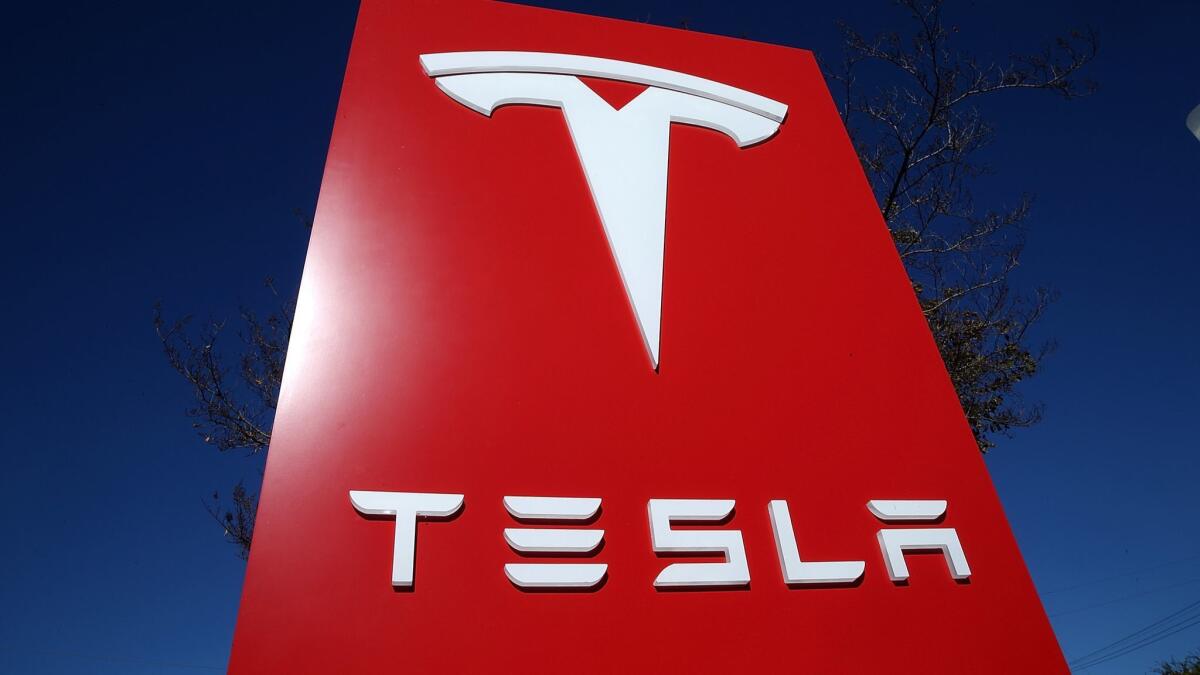Tesla is especially vulnerable to Chinese electric-car tariffs

- Share via
Tesla Inc. needs to brace for another setback after China included electric cars among American products that it would hit with additional tariffs in a counterpunch to the U.S.
Other American auto imports also made the list of products China is threatening — including SUVs, which could even affect BMW AG and Daimler AG. But Tesla is at particular risk. The Elon Musk-led, California carmaker relies on U.S.-built vehicles for all its Chinese sales, whereas U.S. carmakers General Motors Co. and Ford Motor Co. manufacture in China and import few vehicles into the world’s biggest market.
China’s announcement adds to a tough past few weeks for its Musk and Tesla investors, with a flurry of negative news dragging on the company’s shares. China is Tesla’s biggest single market after the U.S., and an additional tariff would hand local electric vehicle manufacturers even more of a pricing edge.
“The jump in tax levy hurts Tesla the most as it had not yet started local production in China,” said Cui Dongshu, the secretary general of China’s Passenger Car Assn. “For GM and Ford, they can always make up with China-produced ones.”
A Tesla spokeswoman based in Beijing wasn’t immediately available to comment.
Tesla shares fell 1.6% to $263.30 around 7:20 a.m. PDT. The stock has dropped more than 15% this year so far.
Tesla has been working with Shanghai’s government since last year to explore assembling cars in China, but it has yet to strike a deal because the two sides disagree on the ownership structure for a proposed factory, people with direct knowledge of the situation said in February.
The U.S. carmaker is already hindered by China’s current 25% import tax, which catapults the sticker prices of Model S sedans and Model X crossovers beyond the means of even more affluent consumers. An additional duty would further relegate Tesla into a niche market, afforded only by the wealthiest.
Hefty import duties have contributed to other carmakers’ decisions to produce vehicles in China under joint-venture agreements. Volkswagen AG makes most of the vehicles it sells in the country at plants there, and about two-thirds of BMW and Daimler sales come from Chinese factories.
Last year, German automakers exported to China about 151,000 cars produced in the U.S., including at a BMW plant in Spartanburg, S.C., and a Daimler factory in Tuscaloosa, Ala., the carmaker lobby group VDA said in an email. Of those, BMW accounted for 100,000 SUVs, the company said. The ratio will change from about midyear, when the luxury carmaker will start producing the X3 SUV in China.
Tesla sold 14,883 vehicles in China last year, accounting for just 3% of the nation’s battery-powered electric vehicle sales and placing it as the No. 10 brand in that segment. China accounted for 17% of Tesla’s revenue for 2017, according to data compiled by Bloomberg.
In the first two months of this year, China imported 36,000 vehicles from the United States, including Teslas, Lincolns and Mustangs, according to China’s PCA.
In February, China imported 2,323 vehicles with electric-only motors from the U.S., and almost all of them — 2,160 — were Teslas.






